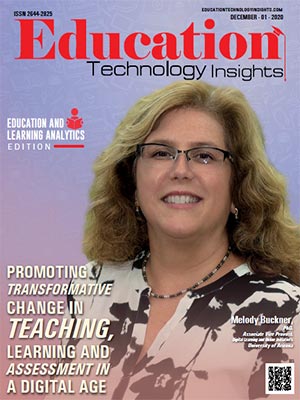THANK YOU FOR SUBSCRIBING
Be first to read the latest tech news, Industry Leader's Insights, and CIO interviews of medium and large enterprises exclusively from Education Technology Insights
The Key to Regaining America's Trust in Higher Ed? Skills
Dr. Marni Baker Stein, Provost and Chief Academic Officer, Western Governors University
 Dr. Marni Baker Stein, Provost and Chief Academic Officer, Western Governors University
Dr. Marni Baker Stein, Provost and Chief Academic Officer, Western Governors UniversityCOVID-19 has put an exclamation point on what we already knew: colleges and universities must do better. Pre-COVID, reports abound of America’s high levels of student loan debt and recent grads struggling to find jobs. And now, with more than 11 million Americans out of work and undergraduate enrollment on the decline, it’s no surprise that many are questioning higher ed’s value proposition.
How can colleges and universities regain America’s trust? The answer is skills.
Pandemic or not, people go to college to get a job. But sadly, just 60% of undergraduates complete within six years, and those who do complete are often saddled with student loan debt and have trouble finding the right job. Citing a disconnect between the skills they need and what college graduates offer, Apple, IBM, Google, and other employers are ditching the degree as the primary proxy for work readiness and shifting to skills-based hiring.
If employers are increasingly focusing their hiring processes on what skills prospective employees bring to the table, why not arm graduates with a verified record of their skills? Why hasn’t higher education caught up?
Much of the data needed to support skills-based education and hiring already exists; but this data is siloed, not easily accessible nor machine-actionable, making the switch to skills-based practices for most employers and educational institutions an expensive and manual effort. In recognition of this urgent need, a large coalition of employers, education providers, technology companies, and the military have come together to accelerate an industry-wide shift to skills-based education and hiring. By establishing a decentralized network of open, accessible, machine-actionable skills libraries, the Open Skills Network is laying the foundation for higher education to catch up to the future of work.
"Citing a disconnect between the skills they need and what college graduates offer, Apple, IBM, Google, and other employers are ditching the degree as the primary proxy for work readiness and shifting to skills-based hiring"
The Open Skills Network’s work will develop a shared language of skills, which will empower students to own their careers like never before, through a student-owned record of achievement called the Learning and Employment Record (LER). The LER goes beyond a standard transcript to include academic credit, certifications, work accomplishments, and a rich description of accumulated skills.
While enrolled in a program, students will gain real-time insights into the labor market value of each skill and competency they gain by course. Students will have tangible, educational, and labor market career compassing tools and rewards that are not only attractive to students but can encourage them to persist. This approach will be especially important in meeting the needs of a fast-growing population of working learners, as well as students from underserved and underrepresented communities. And for students who must put their studies on hold for work or life’s many interruptions, they can pause their studies without leaving empty-handed.
We’re experiencing unprecedented times. Our economy is rapidly changing, and we don’t yet know what the jobs of the future will be. What we do know is that higher ed’s “business as usual” approach no longer works. America’s colleges and universities have propelled countless lives up the ladder of social mobility. Let’s continue that legacy by embracing our skills-based future and let’s provide our students with the tools they need to succeed.
Weekly Brief
ON THE DECK
Read Also
Putting Students First in a Global Classroom
Reflections on Vocational Education and Emerging Opportunities
Elevating Engaged Teaching in a Digital Era
Embedding Immersive Technologies within the Curriculum: Strategies for Sustainable Development
Aligning Innovation with Impact in Higher Education
Advancing Digital Teaching and Lifelong Learning

I agree We use cookies on this website to enhance your user experience. By clicking any link on this page you are giving your consent for us to set cookies. More info
























